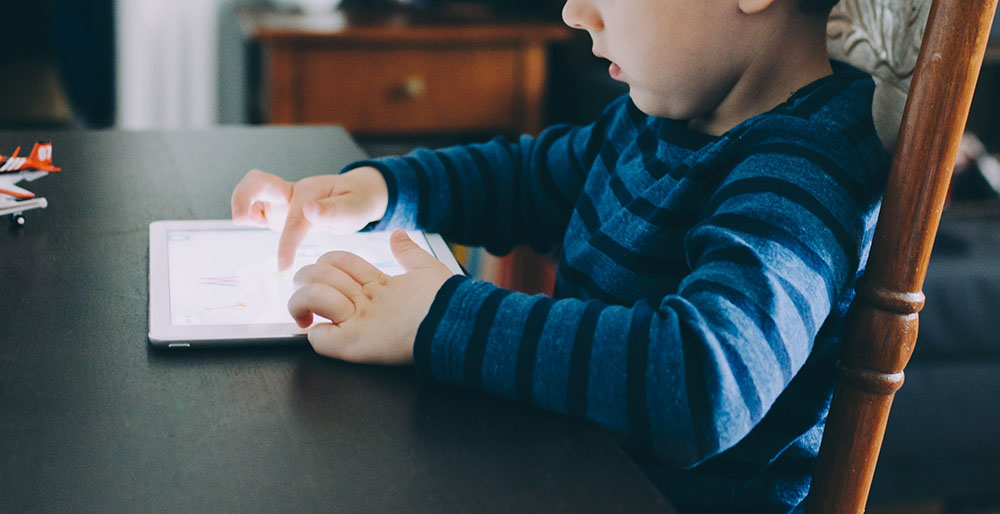How much screen time is too much for kids?
Screen time is a part of modern childhood and here to stay, but how much screen time is too much? And what can we do about it?

How much screen time is too much for kids?
Technology is a part of modern childhood and here to stay. The perks are undeniable: the kids can use screens to learn valuable new skills (there’s an app for everything these days), access quality educational content, and maintain connections to family and friends wherever they are through video calls. Plus any parent knows that half an hour of SpongeBob is a lifesaver when we need a moment of peace to make a phone call or finish some paperwork!
At the same time, it’s hard not to worry that we could be raising a generation that’s finding it ever harder to switch off – especially if we relied heavily on screen-based activities to see us through the lockdowns. We’ve all seen it first-hand: a little bit of screen time helps the kids calm down – but too much can over-stimulate and we’ve suddenly got grouchy juniors on our hands.
But should we feel guilty for snuggling up together in front of our favourite TV program after the kids have used a tablet to finish their homework? At what point does screen time start affecting sleep, causing eye strain or other problems? We’ll look at what research has to say about children and screen time, what the experts recommend, and what we can do if we’re concerned about our kids developing bad digital habits.
How does screen time impact children’s wellbeing?
What do we know about how screen time affects children? There seem to be both benefits and risks. The positives include a boost to early learning, opportunities to find support and connect with others as well as access to beneficial information and new ideas.
Among the potential negatives, device use right before bedtime can stimulate the brain and make it harder for our youngsters to nod off at night and get their full quota of shuteye. Perhaps related to this, excessive screen time may also have a negative impact on the cognitive abilities of children. Other strikes against liberal screen use include the associations with short-sightedness, weight gain and chronic low mood.
However, a couple of other studies concluded that there is no robust evidence that screen time itself is ‘toxic’ or that there’s a proven causal link between the time spent on tablets, phones and gaming consoles and negative health outcomes. These studies suggest that the root problem isn’t the screen time itself but forgoing other activities that are essential for kids’ wellbeing, such as outdoor play and family time, in favour of consuming digital entertainment.
What limits do the experts recommend?
Just as research on the topic isn’t conclusive, unfortunately the guidance given to parents isn’t consistent either.
The American Academy of Pediatrics (AAP) makes several specific recommendations for parents. For example, their advice is to limit screen interaction to video calls and educational content watched together with a parent until two years of age, and then limit the time spent on electronic devices to an hour per weekday until the age of five.
In contrast, the Royal College of Paediatrics and Child Health (RCPCH) make only one specific recommendation: to avoid screens an hour before bedtime. They suggest that there isn’t enough direct evidence to support other strict limits in any age group. They argue that individual circumstances matter more, and as long as our kids are thriving and enjoying plenty of sleep, physical activity and face-to-face social interaction, there’s no need for us to worry excessively about limiting screen time.
What also matters is what our children use their screens for. Spending twenty minutes on an app to learn French on a Saturday morning won’t have the same effect as, say, playing a racing game for the same amount of time just before bed on a Tuesday night. And to complicate matters even more: what’s reasonable for one child may not hold true for another kid whose behaviour and personality are completely different!
How to spot and tackle screen time problems
When does screen time become a problem? And what can we do if we notice that the lure of the screen has become too powerful? Some signs we might see when a child is developing an unhealthy relationship with electronic devices includes complaining when asked to stop using them, and being preoccupied with screen-based activities while losing interest in other pastimes. If screen use starts affecting sleep and mood and interferes with social interactions and exercise, it’s important to intervene.
The Royal College of Paediatrics and Child Health (RCPCH) has provided a series of questions for parents to determine if screen use has gotten out of hand, while The American Academy of Pediatrics (AAP) offers an online media plan tool which families can use to set up their own rules for media use at home. Some of the ideas for limiting screen use include designating screen-free areas and times, such as bedrooms and meal times. Screen time can also be conditional. For example, devices could be allowed only after homework is done during the week.
The key message is that a whole family approach to screen time works best. Sit down with the kids to have a chat about the importance of different types of activities, and get them to shout out their own ideas. For example, if screen time is their primary avenue for winding down, what other fun and relaxing activities can they think of that don’t involve plugging in?
As parents, we also need to consciously model good digital habits and make sure we take sufficient breaks from our own smartphones and laptops at home. When agreeing to specific limits with the kids, they’re much more effective and the kids are more likely to respect them if the adults follow them too!
If children make a habit of trying to sneak in extra screen time behind our backs (another sign that there could be a problem), parental controls on phones, tablets and gaming consoles can block their use during specific hours during the day or when a set limit in use is reached.
Summary
As ever it’s a bit of a grey area in terms of one-size-fits-all rules but here’s our common-sense list of tips:
- Make sure that screen time activities are age-appropriate
- Encourage screen activities that are creative and help form positive connections with friends and family
- Avoid screen time in the hour before bed
- Encourage hobbies and activities away from screens (reading, sport, art etc)
- Don’t be afraid to make changes if screen time starts to become a problem
- Lead by example - put those phones away grown ups!
Following these simple tips should be enough to keep screen time as a helpful, fun activity in the home rather than a point of contention.
Screen time guidelines
- AAP guidelines
- https://www.aacap.org/AACAP/Families_and_Youth/Facts_for_Families/FFF-Guide/Children-And-Watching-TV-054.aspx
- AAP family media plan
- https://www.healthychildren.org/English/media/Pages/default.aspx?gclid=Cj0KCQiApbzhBRDKARIsAIvZue8lTeTBhvVBTkhhKKeKtMdJh9IvHGRkqxsn8FSy-Q0Er_hXiHgVrXMaAlM5EALw_wcB
- RCPCH guidelines
- https://www.rcpch.ac.uk/resources/health-impacts-screen-time-guide-clinicians-parents
Further reading
- Children and Adolescents and Digital Media
- https://publications.aap.org/pediatrics/article/138/5/e20162593/60349/Children-and-Adolescents-and-Digital-Media
- Cognition in US children
- https://www.thelancet.com/journals/lanchi/article/PIIS2352-4642(18)30278-5/fulltext
- NHS (short-sightedness and screens)
- https://www.nhs.uk/conditions/short-sightedness/
- Screen media use and obesity
- https://www.ncbi.nlm.nih.gov/labs/pmc/articles/PMC5769928/
- Children’s screen time guidelines too restrictive
- https://www.ox.ac.uk/news/2017-12-14-children%E2%80%99s-screen-time-guidelines-too-restrictive-according-new-research
- Signs your child might be addicted
- https://news.umich.edu/kids-and-screen-time-signs-your-child-might-be-addicted/
- Effects of screen time on the health and well-being of children
- https://bmjopen.bmj.com/content/9/1/e023191
If you liked this post and want more inspiration, tips and updates from Squiggle just hit ‘Like’ on our Squiggle Facebook page and follow us on Twitter and Instagram. You can also sign up to our regular newsletter in the footer below.
Photo by Kelly Sikkema on Unsplash
